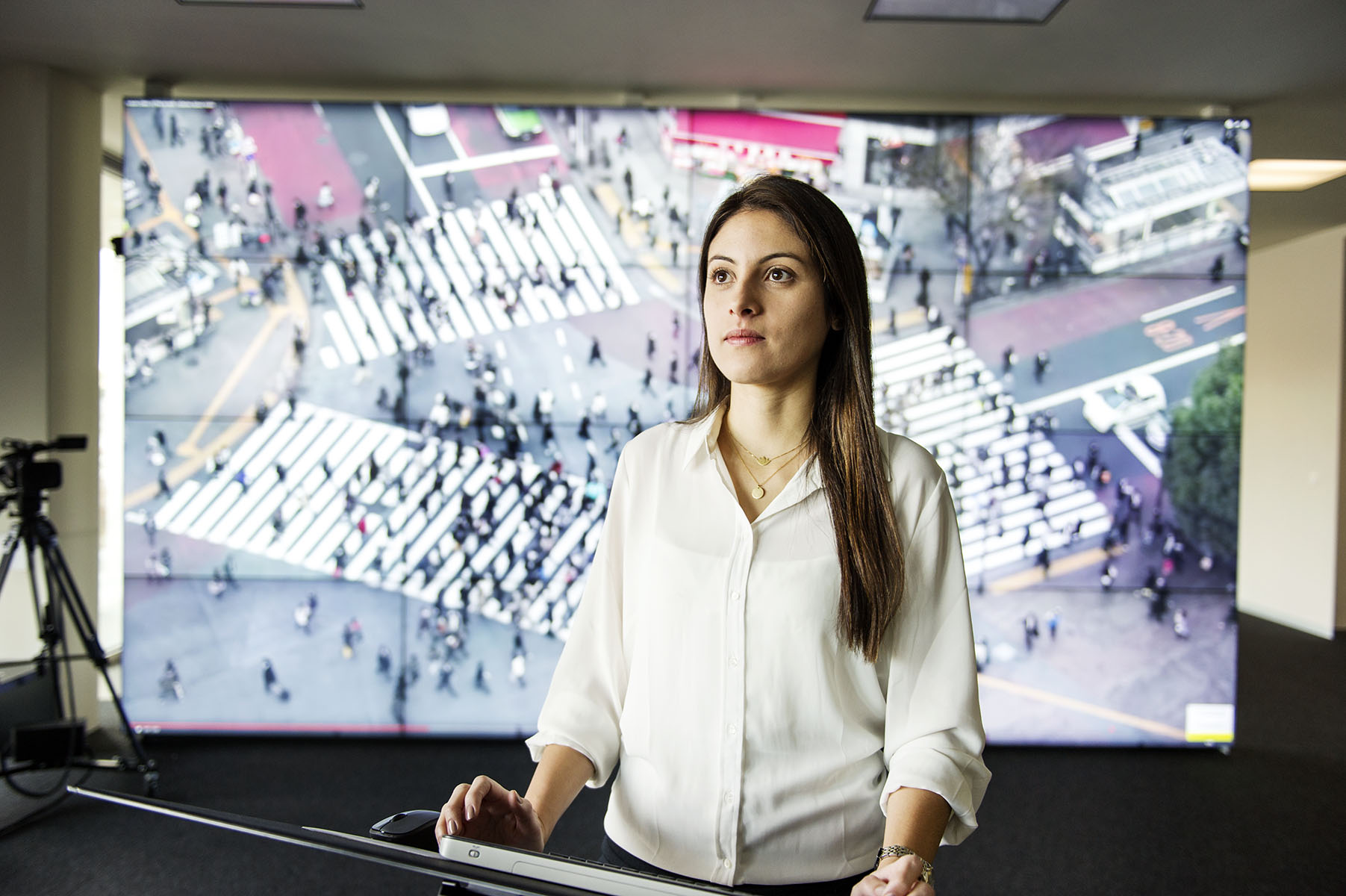Even when studying to be an architect, designing attractive buildings wasn’t satisfying enough for Estefania Tapias. Today she is an expert in urbanisation and climate change, specialising in the research of outdoor thermal comfort.
Estefania Tapias is a leading expert in outdoor thermal comfort. Her research focuses on how temperature, humidity and wind speed affect people’s outdoor thermal comfort in urban environments. To do so, the 29-year-old regularly shuttles between the ETH Future Cities Laboratory in Singapore and the Department of Architecture in Zurich. Additionally and since 2014 she has built up a series of Massive Open Online Courses (MOOC) on planning the cities of the future, which have already attracted over 116,600 students worldwide. As postdoctoral assistant in the research group headed by Gerhard Schmitt, Professor for Information Architecture at ETH Zurich, she is also involved in the interdisciplinary research project “Cooler Calmer Singapore”, where one of the goals is to enhance outdoor thermal comfort for city dwellers by reducing the amount of anthropogenic heat.
Change of career path
Originally Estefania Tapias had no intention of going into research: she wanted to be an artist. But when it came to choosing a course of study, her father advised against it. As a qualified economist and founder of an educational institution for entrepreneurs from the low-income Colombian population, which he heads together with his wife, he attaches great importance to a solid academic foundation. His eldest daughter had studied political science, and the middle one medicine.
As a compromise, Estefania Tapias decided to study architecture at Pontificia Universidad Javeriana in her home city of Bogota. However, she soon realised that her studies were not enough of a challenge. “I didn't just want to build beautiful houses, I wanted to get to the root of problems and find solutions.” In the family home, social commitment had been instilled from an early age. Sustainability was a topic she discovered for herself and has been passionately exploring ever since.
To broaden her knowledge, she switched to a master’s course in sustainable architecture at the Politecnico di Torino. “Our parents brought us up to be independent early on," she says and recalls how, at the age of six, she visited relatives in California with her sisters for several months – without her parents. At the age of eleven she lived with an aunt in France for three months. “I didn’t learn French there, as my parents had hoped, because my aunt mostly spoke Spanish. But since then I know how to cope with living abroad.” Today, the researcher feels at home all over the world.
Return as a researcher
She only returned to Colombia while researching for her doctorate. “For my master’s degree, I learned how to design a sustainable building,” Tapias explains. “As a next step, I wanted to know how the technology needs to be developed so that sustainability can be permanently integrated into urban environments.”
She had already built contacts at ETH Zurich during her time in Turin and applied for the post of doctoral researcher at the Department of Architecture, where she studied outdoor thermal comfort in the Colombian city of Barranquilla. “Close to the Caribbean coast, this city has a tropical climate, so that even a modest rise in temperature caused by global warming can make conditions unbearable for residents.”
Good connections
To produce accurate results, Estefania Tapias not only needed technical equipment, such as measuring devices, but above all reliable local partners for collecting data. Here the scientist benefited from the fact that she not only likes doing research, but also enjoys networking. "I went to the three different universities and got some of the students on board." She developed an app to collect data from citizens.
Tapias was also able to persuade Professor Andreas Matzarakis, an internationally renowned expert in climate meteorology at the University of Freiburg, to assist with her project. “Lots of people asked me how I managed to do that,” she says. “I simply sent him an email, although ETH Zurich’s reputation certainly helped my case.” At the same time as completing her doctorate at ETH Zurich, she attained the Climate-KIC PhD-Label from the European Institute of Innovation und Technology (EIT).
Linking everything together
Despite her successes, she has remained modest. "I don't often feel like a scientist," she says. Above all, it is her openness to people and new topics that motivates her. The result is pretty impressive, however. Recently she was nominated by ETH for the Forbes list "30 under 30" in Science. And even though she won't make it onto the prestigious list, it is very likely that there are other honours waiting for her in her career. She is already a member of the "Global Shaper" Community of the World Economic Forum (WEF) and has set up the EIT Alumni organisation. She also wants to set up an initiative for women in her spare time. “My mother was always torn between her work at the educational institute and caring for her daughters," she says. "I don't want women to have to choose in the future: I want them to be able to pursue both, professional and personal goals in their lives."

Comments
No comments yet